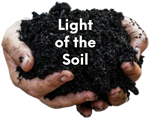It also highlights the crucial role of soil amendments, specifically worm castings and compost teas, in enhancing the light cycle of soil.
These amendments serve to enrich the soil, promote the health of soil microorganisms, and contribute to the overall well-being of forest ecosystems.
1. Introduction
Forests are complex ecosystems teeming with diverse life forms. Beneath the canopy and under the forest floor lies an often-underappreciated world: the soil. This paper aims to delve into the intricate dance of life within the soil, focusing on the light cycle and how soil amendments, such as worm castings and compost teas, play a pivotal role in sustaining and improving forest ecosystems.
2. The Role of Photosynthesis
Photosynthesis, the foundational process of the light cycle of soil, takes place primarily in plant leaves, where chlorophyll captures sunlight and converts it into energy. This energy is stored in the form of organic compounds. The oak tree exemplifies this process.
3. The Generosity of the Oak Tree
The oak tree acts as a solar panel, capturing sunlight throughout the day and generously sharing its energy with the soil. It does so not only through root exudates but also by facilitating the growth of soil-dwelling microorganisms through the incorporation of soil amendments like worm castings.
4. Microbial Communities in the Soil
The introduction of worm castings, rich in organic matter and beneficial microorganisms, greatly enhances the microbial community in the soil. Earthworms, through their feeding and burrowing activities, create channels for air and water, improving soil structure and microbial habitat. This fosters a thriving microbial community, which plays a critical role in breaking down organic matter and making essential nutrients available to plants.
5. The Mycelium Network
Fungi, essential participants in the light cycle of soil, benefit from the addition of compost teas. These teas introduce a diverse array of microorganisms, including beneficial fungi, which can aid in the establishment of mycorrhizal networks. Mycorrhizal fungi help connect the oak tree to neighboring plants, facilitating the exchange of nutrients and information, thereby strengthening the forest community.
6. The Ongoing Cycle with Amendments
The light cycle of soil remains an ongoing process, fueled by the oak tree's continuous photosynthesis. The introduction of worm castings and compost teas, acting as natural soil amendments, further enriches the cycle. Worm castings provide a steady supply of organic matter and beneficial microorganisms, while compost teas introduce a diverse microbial population that supports nutrient cycling.
7. Conclusion
The light cycle of soil, enriched by worm castings and compost teas, emphasizes the profound interconnectedness of life within forest ecosystems. It underscores how the generosity of the oak tree is complemented by these amendments, creating a more resilient and vibrant ecosystem. These soil amendments not only nourish the soil microorganisms but also foster the health and vitality of the entire forest.
Understanding the role of worm castings and compost teas in enhancing the light cycle of soil is essential not only for scientific appreciation but also for practical applications in sustainable forestry and agriculture. By actively incorporating these amendments, we can improve soil health, foster robust microbial communities, and ensure the long-term well-being of our forests and the planet as a whole. Small Step Huge Change.

